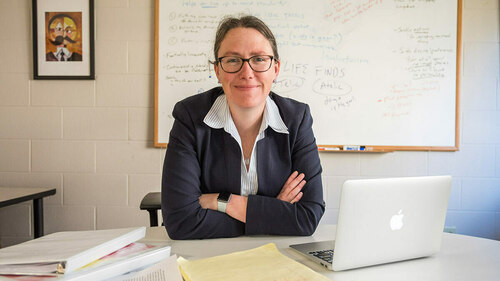
Meghan Sullivan, professor of philosophy and the Rev. John A. O’Brien Collegiate Chair, has been named director of the University of Notre Dame’s Institute for Advanced Study. As of July 1, Sullivan will oversee the institute, including its flagship residential fellowship and graduate student fellowship programs.
“The Notre Dame Institute for Advanced Study provides a forum for scholars from many backgrounds to collaborate on questions that benefit from joint-focus and sustained research. Our residential fellowship program gives visiting scholars the resources and colleagues to tackle questions bigger than just a single discipline,” said Sullivan. “I am excited to lead the Institute as our fellows – and Notre Dame as a whole – work toward more high-impact, discipline-crossing research on the most pressing problems we face.”
Sullivan’s scholarship focuses on philosophical problems concerning time, modality, rational planning, value, meaning and religious belief. She is the current director of the University Philosophy Requirement and creator of the God and the Good Life program. She also leads the Engaged Philosophy Group, a team of staff, doctoral students and postdoctoral scholars, which currently manages three major national/international projects funded by the Andrew W. Mellon Foundation, the John Templeton Foundation and the National Endowment for the Humanities. Sullivan published her first book, "Time Biases," with Oxford University Press in 2018.
“Professor Sullivan has led a number of successful innovative new initiatives at Notre Dame. We look forward to that same creativity applied to a University-wide basis in her new role as director of the Notre Dame Institute for Advanced Study,” said Robert J. Bernhard, vice president for research and professor of aerospace and mechanical engineering.
In conjunction with Sullivan’s directorship, the institute has added a thematic option to its 2020-2021 call for fellowship applications. The theme will be “the nature of trust,” fostering research on the scientific, social, ethical and design-based dimensions of trust with a broad range of perspectives, topics and methods. Fellowship applications are encouraged from all eligible scholars and scientists whose work involves this theme and who are interested in advancing their work through interdisciplinary discussion and collaboration. Applications from scholars working on projects outside this theme are also encouraged.
Residential and graduate fellowship applications for the 2020-2021 academic year are due by 11:59 p.m. Sept. 16. To learn more about these programs, visit ndias.nd.edu/fellowships.
For the past six years, the institute and its fellowship programs have been led by Brad Gregory, Dorothy G. Griffin Collegiate Professor of History. “We are grateful to Professor Gregory for his leadership of the Notre Dame Institute for Advanced Study. His contributions were vital in growing the institute as a recognized center for academic research inspired by the Catholic intellectual tradition that is unique in the academy,” said Bernhard.
Launched in 2008 as a Strategic Research Initiative of the University, the Notre Dame Institute for Advanced Study convenes an interdisciplinary group of faculty fellows (external and internal), top doctoral candidates and undergraduate scholars to study questions that require a joint focus, benefit from sustained research and discussion, and advance our understanding on core issues that affect our ability to lead valuable, meaningful lives. Notable academics and public figures who have served as Fellows or offered public talks and seminars at the NDIAS include Horst Koehler, former president of the Federal Republic of Germany; Russian artist Maxim Kantor; and Nobel laureates Frances Arnold and Richard Ernst. To learn more, visit ndias.nd.edu.
Contact: Kristian Olsen, fellowships, outreach and operations program manager, Notre Dame Institute for Advanced Study, kolsen1@nd.edu, 574.631.2830; @NotreDameIAS
Originally published by at ndias.nd.edu on June 18.